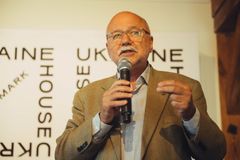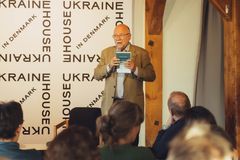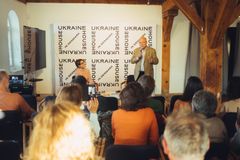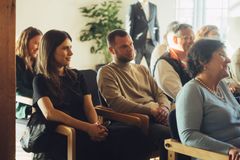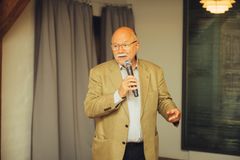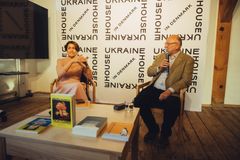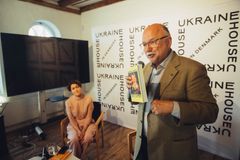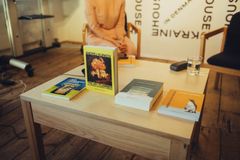“... when you have a real tragedy in front of your eyes, ... you cannot invent a more tragic story than life can produce. I couldn’t write fiction for two and a half years.” Ukraine House hosts conversation with Andrei Kurkov
On May 2, Ukraine House in Denmark hosted a literary evening with Andrei Kurkov, one of Ukraine's most prolific and internationally recognized authors. The writer shared his personal reflections on becoming an author under the Soviet regime and the impact of war on national identity and contemporary literature.
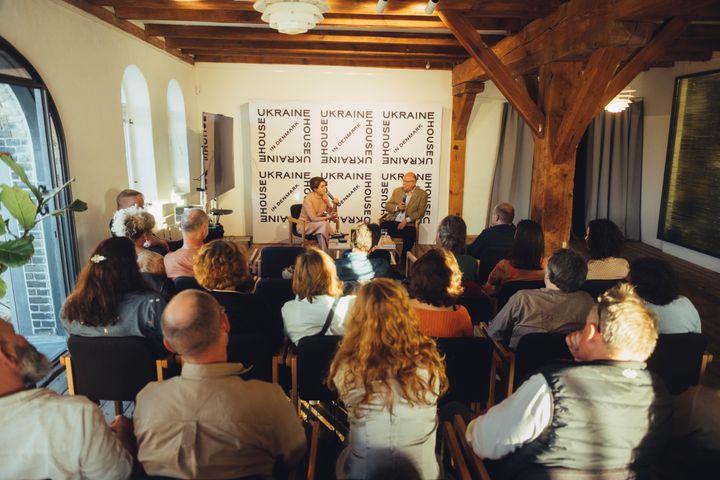
Kurkov transported the audience back to his childhood in Soviet Ukraine, where laughter was both a weapon and a refuge. He described late‐night gatherings in cramped apartments, where political dissent mixed with cups of port wine. These clandestine salons offered a rare taste of freedom under an oppressive regime. It was in that atmosphere that he first discovered the power of words to subvert authority and connect people. Those jokes arrived with illicit manuscripts, teaching him that ideas can travel even when borders and authorities forbid them. These engagements with secretive satirical culture became a formative experience that laid the groundwork for a lifetime devoted to truth‐telling through fiction.
By the late 1970s, Kurkov started competing in secret joke-telling contests in Crimea. He recounted the thrill of standing before an audience of intellectual dissidents, each story weighed and tallied. These two-week gatherings near Sudak were as much about solidarity as they were about satire. Winning those contests meant claiming a momentary triumph over authoritarian fear: “I started reading illegal literature and satire which I enjoyed very much. […] In 1977-78, my brother and I twice took part in illegal joke-telling competitions in Crimea. People from all over the Soviet Union — intellectuals and anti-Soviets — gathered near Sudak for two weeks, telling jokes, counting who told how many jokes, drinking wine. We won once.”
He felt empowered to translate that satirical spirit into prose. Yet his early manuscripts, dark and cynical, confronted the wall of Soviet literary orthodoxy: “I never managed to become a Soviet writer because what I wrote was funny, was black, was a bit cynical. […] When I showed my text to different Soviet publishers, they were saying it is not Soviet literature.” There was even a situation, where he was almost ready to give up and betray his humor, when a Communist Party-affiliated publishing house employee promised him to ensure his humourless short stories would be published if he was to marry her. “I decided that was too much of a betrayal — as I would have to write short stories which I didn’t want to write and marry someone I didn’t want to marry — so I refused and my book was not published. And I’m very happy I never published those short stories because they were written as a form of compromise between censorship and myself.”
Kurkov then spent eighteen years smuggling manuscripts through Poland until a Swiss publisher finally recognized his talent. The acceptance of Death and the Penguin brought him from underground dissident to European bestseller.
With creative freedom secured, Kurkov turned his pen to Ukraine’s harsh reality, traveling in 2015 for the first time to the 430-kilometer “gray zone” where civilians lived under constant threat. He recounted elderly villagers cut off from all services, choosing to face bombardment rather than flee. Their quiet endurance became the heart of his frontline chronicles: “There were dozens of villages — some with only two or three people living, old people — no electricity, no gas, running water, medical help, no police, no authority. They were abandoned, and mostly these were the old people… it was easier to imagine that they are killed at home than that they have to travel and nobody knows who will help them.” This experience became the foundation of one of his bestseller, “Gray Bees”, where a lone beekeeper stranded in the “gray zone” between Ukrainian and Russian military positions who rigs his hives against shellfire and smuggles his bees to Crimea, finds his old Crimean Tatar friend and reconnects with a land and people torn from Ukraine.
Now, in times of Russia’s full-scale invasion of Ukraine, Kurkov also observed that many of his fellow writers have abandoned fiction for non-fiction: “Writers are different but what happened to most of them — almost everybody stopped writing fiction. Because when you have a real tragedy in front of your eyes, you understand that [...] you cannot invent a more tragic story than life can produce. I couldn’t write fiction for two and a half years.” Therefore, the incentive for the writers became to use diaries and articles to actually explain, especially abroad, what is happening and to encourage empathy to secure support.
Amid that shift, Kurkov still highlighted poetry’s importance in the frontlines. He described listening to a poetry reading for soldiers in a remote field hospital: “In the first year of the full-scale invasion, poetry became extremely important. Poets were visiting soldiers and reciting their poems, and I went a couple of times — I saw like two hundred soldiers crying because a lady poet recited a poem about a mother. Everybody immediately relates to his own family, to his own life before the war. This emotional charge helps them to forget about horrors — but still, they are crying even now, because Ukrainian poets are still visiting soldiers not far away from the front line.”
Kurkov further warned of a looming “black hole” in Ukrainian literature as more and more poets are being killed in war. Those who survive will inherit the task of filling this void: “We have more than 120 poets and writers who are killed in the war. […] There will be several years of emptiness, a black hole in Ukrainian literature. Those who survive will have to write much more to fill this gap.”
Even though Russia is trying its best for Ukrainians to lose hope and live in constant fear and anxiety, Kurkov, as a writer and an intellectual, remains unflinchingly committed to hope and believes that people need a happy end because books give energy and hope. For him, he “writes for people who believe that life is good, who love life”, because life is good, even when there is so much darkness around.
Ukraine House in Denmark extends its deepest gratitude to Andrei Kurkov for sharing his journey and belief in literature’s power to uplift and inspire.
Keywords
Images
About Ukraine House
The Ukraine House in Denmark is a civil society organisation of Ukrainian cultural diplomacy based in Copenhagen. Its mission is to form an enduring positive influence of Ukraine on Ukrainian-Danish cooperation, security, and lasting peace in Europe.
Subscribe to releases from Ukraine House in Denmark
Subscribe to all the latest releases from Ukraine House in Denmark by registering your e-mail address below. You can unsubscribe at any time.
Latest releases from Ukraine House in Denmark
Democracy stands because the Ukrainian infantry stands: Ukraine House at the Copenhagen Democracy Summit20.5.2025 12:42:36 CEST | Press release
Since 2022, the Copenhagen Democracy Summit has become a vital platform for Ukraine House in Denmark to bring Ukraine’s voice to those shaping global politics and policies. At the entrance of CDS 2025, Ukraine House in Denmark, in partnership with the Embassy of Ukraine, presented a modest but powerful installation by the Ukrainian Infantry: “Democracy stands because the Ukrainian infantry stands.” It featured combat-worn boots from the frontline—not parade boots like those seen on Red Square, but real, battered ones, marked by mud and fire. The boots are silent witnesses to sacrifice, and a reminder that freedom never defends itself. Someone always does.
Ukraine House in Denmark Hosts Chornobyl Legacy Discussion with Professor Serhii Plokhy7.5.2025 08:00:00 CEST | Press release
On Sunday, April 27, Ukraine House in Denmark had the honour of hosting a discussion dedicated to the legacy and present-day relevance of the Chornobyl disaster. We were privileged to welcome Professor Serhii Plokhii, Director of the Ukrainian Research Institute at Harvard University and a globally recognized authority on nuclear catastrophes. Professor Plokhii, who joined us at the opening of Ukraine House, opened by reminding us that “authoritarian regimes are there to create disasters—small disasters and big disasters—and Chornobyl is about a big disaster that can destroy life on Earth.” He went on to draw a chilling parallel between 1986 and 2022: “The most disturbing part of that new Chornobyl crisis that emerged in 2022 was that it was caused by the very same phenomenon—the authoritarian regime that has complete disregard for norms of international law, for human life, for environmental concerns.”
II Forum “Decolonizing Mindsets for Security in Europe” Calls for Urgent Cultural Reframing to Strengthen Democracy2.5.2025 08:00:00 CEST | Press release
On April 25, Ukraine House in Denmark hosted the second edition of the Forum “Decolonizing Mindsets for Security in Europe,” convening leading cultural and political thinkers to examine how colonial legacies shape memory, policy, and Europe’s security landscape. “At a time when cultural policy, memory, and history shape the global struggle for freedom and democracy, it's vital to reflect critically on the narratives that define how we see the US, Europe, Ukraine, and Russia. For Ukrainians, decolonisation means uncovering layers of russification and reclaiming our history, culture, and decision-making free from Russian-centric optics. But Ukraine’s security also depends on the willingness of democratic allies to emancipate themselves from cultural superpower biases—to recognise Ukrainian contributions to world heritage and engage with Ukraine as an equal partner in defending dignity and democracy. That’s why we will continue to foster dialogue around decolonizing mindsets—because only
Making Russia Pay – International Accountability Pathways to Justice discussed at Ukraine House Panel16.4.2025 08:01:53 CEST | Press release
As Russia’s war enters its third year, the question isn’t whether Ukraine will endure—but whether justice will. On April 9, Ukraine House in Denmark, in partnership with the Alliance of Democracies Foundation, convened a public discussion, “Establishing Accountability for Russia’s Actions in Ukraine”, with a sharp focus: how the world can make Russia pay—literally and legally—for its aggression. Featuring Jonas Parello-Plesner, Executive Director of the Alliance of Democracies Foundation, and Julia Kyrpa, Board Member of the Register of Damage for Ukraine (RD4U), the conversation illuminated a fast-moving and historic effort: building an international compensation system without Russia’s consent.
Panel Discussion: Establishing Accountability for Russia’s Actions in Ukraine2.4.2025 15:44:26 CEST | Press invitation
Copenhagen, Denmark – April 9, 2025 – As the world watches negotiations, ceasefires, and peace talks unfold, the reality on the ground in Ukraine remains stark. More than 180,000 documented war crimes, the forced deportation of at least 19,546 Ukrainian children, and relentless attacks on Ukrainian cities, homes, and infrastructure raise an urgent question: Can there be a just peace without full accountability?
In our pressroom you can read all our latest releases, find our press contacts, images, documents and other relevant information about us.
Visit our pressroom
